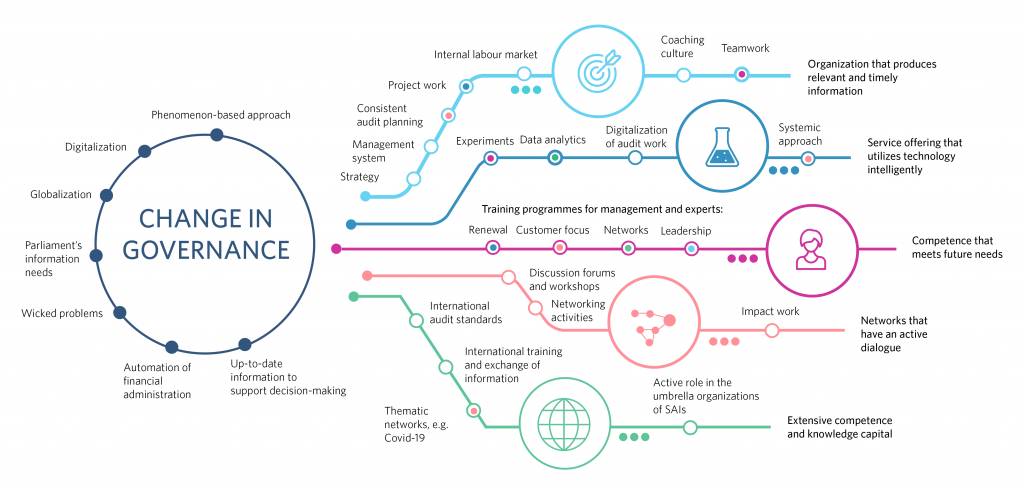The audit sector is changing rapidly. The digitalization of central government and the centralization of financial administration services and related information systems are creating a new kind of operating environment for audit work. Holistic management and overall understanding of systems play a more important part than before. In the audit of policymaking, in turn, the need for a systemic approach is underlined by cross-administrative efforts, interconnections between issues, and multi-sectoral methods of knowledge formation.
Parliament’s information needs are changing, and it has become necessary to review the timeliness and relevance of audit information from the perspective of decision-making. Therefore, the National Audit Office has renewed the planning and implementation of its activities, which have previously been based on different audit types, to make room for common planning and project work that put the entire personnel’s competence and expertise into better use.
International examples of a new way of organizing audit work support the management and organization change we implemented in the winter of 2019 to support the NAOF’s strategy. There are two strong goals that steer our renewal: increasing the societal impact of audits and developing the personnel’s competence. The entire personnel have expressed their firm support for these goals in the dialogue we have conducted about our strategy.
Team-based project work provides ample opportunities for learning and utilizing the competence potential. Developing the operating models boldly and increasing innovation have occasionally been challenging targets in a workplace community of risk management experts. This kind of renewal takes time, but persistent efforts will be rewarded.
Achieving new objectives requires interaction, an active and open dialogue, presenting and justifying opinions, and argumentation. Together we determine how all of our work supports the NAOF’s goals in the big picture. We create an atmosphere that promotes mutual encouragement and underlines the societal impact of the NAOF’s work.
The renewal was desired and makes information easier to use
The NAOF’s ambitious renewal has already received good feedback from our stakeholders. They have confidence in our work, and the information we produce supports the renewal of public administration. The heads of our impact areas have created effective networks and engage in an active dialogue with the public administration. More sensitive identification of Parliament’s information needs and new kind of information targeting have also increased the societal impact of audit work. A proof of this is that the parliamentary committees utilize the NAOF’s expertise, opinions and reviews more than before.
When targeting the audit work, our main focus is on comprehensive monitoring of policymaking. Successful renewal requires acquiring new skills and developing the operating models. We have improved our leadership skills and promoted a visionary approach by redefining the management’s responsibility areas and duties and by management training. Correspondingly, we have also supported the management skills of our experts in training groups through training and common development tasks.
Examples of our new kind of working together and experimental approach from recent years include the young professionals’ programme Vision, the experts’ development programmes ASKEL 1 to 4, the management’s training programmes, and the building of competence centres to strengthen competence development. Our experts’ joint projects have tested new kind of cooperation across organizational boundaries and fields of expertise, and the experiments gained in them have encouraged us to implement our new organization and operating model. Systemic thinking requires cooperation between experts and a versatile combination of competence.
The audit sector has always been international, and the importance of cooperation is especially pronounced during changes
The changes that the audit sector is undergoing are also reflected in more active international networking. Data analytics and AI-based tools are developed in networks of experts from peer agencies. The NAOF complies with the international standards of external audit. Standards and working procedures are developed in working groups and networks under the umbrella organization INTOSAI and its regional organizations.
In the Governing Board of the European organization EUROSAI, Finland has been responsible for creating new working methods related to foresight and the identification of new phenomena. The global sustainable development goals, which are important to Finland, play a key role in the Working Group on Environmental Auditing, chaired by the NAOF. The audit cooperation related to the coronavirus crisis was launched on the NAOF’s initiative and has supported the comparability of different governments’ actions in the exceptional circumstances. International work strengthens the NAOF’s competence and gives us an opportunity to have a greater impact on the development of the audit sector.
Foresight, assessment and flexibility keep auditing up to date
The renewal of an expert organization is an inspiring journey, the success of which is best guaranteed by broad and open discussion. It is important to make the excellent results we have achieved visible. This also helps us to understand that our development efforts have borne fruit. However, when operations are renewed, it is wise to accept that all ideas that have been tested should not be pursued or that all prototypes should not be turned into new products. Feedback from stakeholders provides significant support for the development work here as well.
The NAOF is undergoing changes to be able to continue providing Parliament with relevant and timely information to support the decision-making. The rapidly developing technology improves the service reliability of financial management systems. At the same time, policymaking requires more comprehensive information and understanding of the interconnection of issues. The NAOF’s target is to foresee these changes that have an impact on our operations and to harness competence more flexibly for new kind of working. In this way, we will also safeguard the functioning of central government and support the development of new operating models in general government.



